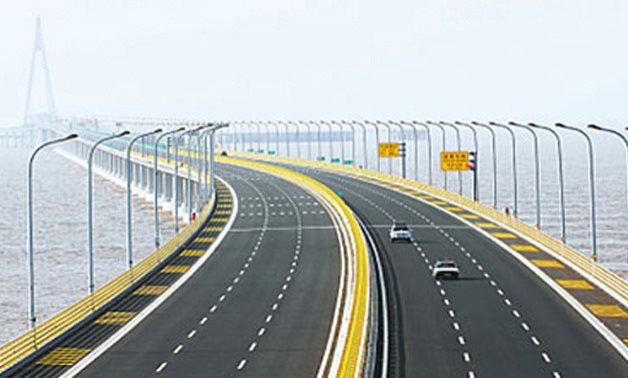
Egypt’s road quality ranking improved from 118th to 28th thanks to national projects: Syndicate head
CAIRO – 26 September 2023: Over the past few years, transport projects have been front and center as "national initiatives" in the Republic of Egypt's developmental journey. Under President Abdel Fattah El-Sisi's regime, road and bridge projects have been prioritized, and viewed as the arteries of development.
Major Road Developments: A Snapshot
The Ministry of Transport has achieved the following major milestones as part of the National Road Project:
• Construction of 7,000 km of new roads.
• Completion of projects spanning 5,500 km, some of the most significant include:
• Upgrading the Cairo-Minya Western Desert Road covering 230 km, and costing EGP 7 billion.
• Improving the Upper Egypt-Red Sea Road (Sohag-Safaga) of 180 km, at EGP 1 billion.
• The Shubra-Benha freeway, stretching over 40 km, and costing EGP 3.5 billion.
• The northern arch of the Regional Ring Road of 90 km, with an investment of EGP 8 billion.
• El-Galala Road spanning 82 km, and funded with EGP 4.5 billion.
• Refurbishing the Tunnel-Sharm El-Sheikh route of 350 km, costing EGP 3.2 billion.
• The road from the Ahmed Hamdi Tunnel to Kilometer 109 of the Suez Road, measuring 24 km at EGP 870 million.
• The service road on the Cairo-Suez distance from the Regional Ring Road, measuring 37 km, and priced at EGP 930 million.
• Doubling and upgrading the Safaga/Quseir/Marsa Alam road of 200 km, at EGP 1.738 billion.
• Upgrading the Mansoura/Jamsa route (Jamsa tributary) of 50 km, costing EGP 1 billion.
Bridging the Nile: Transforming Connectivity
A staggering 13 axes including Talha, Bani Mazar, and Adly Mansour were executed at EGP 14 billion. Furthermore, 1,000 km of primary road networks were developed.
Also, the National Project for Paving Local Roads within the provinces is ongoing, with the initial phase covering 12 provinces with 225 projects (at EGP 2 billion). Of these, 202 have been completed.
Smart Transportation: The Future is Here
Egypt is embarking on a smart transportation system using cutting-edge IT methodologies. Modern electronic gates, sensors, cameras, and radars are deployed to enhance road safety. The first phase covers seven roads (1,189 km in total), with the second phase extending to 15 roads (5,195 km).
Railway Renaissance
President El-Sisi's era witnessed significant railway advancements. Over 110 American "General Electric" locomotives were imported, accompanied by nearly 800 regular and air-conditioned Russian train cars. Moreover, six luxury trains from Spain's "Talgo" were introduced, and 172 locomotives were rehabilitated, with 45 having been completed.
Metro and Monorail Developments
In the transport sector, the Cairo Metro has seen significant upgrades. The fourth phase of the third line, stretching 11.52 km with ten stations, has been launched, as well as four stations in the third phase. Six new stations are set to be operational soon. Under President El-Sisi, the Electric Train Project LRT, covering 103 km and comprising 19 stations, was also launched.
The Ministry of Transport is also executing two monorail projects: the East Nile Monorail (56.5 km, 22 stations) and the West Nile Monorail (42 km, 12 stations).
In the maritime transport sector, several projects have been completed at the Alexandria port at a cost of EGP 824 million. A free link was also established to connect the Alexandria port to the international coastal road, axis 54, at a cost of EGP905 million.
In the Damietta port, several projects have been completed, the most significant of which is the establishment of a multi-purpose station (a dock of 681 meters in length and 17 meters in depth) at a cost of EGP 1.365 billion, and the deepening of the navigation channel and the turning basin to 16 meters at a cost of EGP 189 million.
As for the Red Sea ports, several projects have been completed, the most important of which is the development of the Safaga maritime port at a cost of EGP 510 million, the development of the Hurghada maritime port at a cost of EGP 222 million, the establishment of a mechanical lifting bridge at the Sharm El-Sheikh port at a cost of EGP 68 million, and also the construction and supply of two marine tugboats with a pulling force of 55 tons at a cost of EGP 513 million.
In the land and dry ports, several projects have been completed, the most significant of which is the establishment of the Qustul land port at a cost of EGP 79 million, and the establishment of the Arqin land port at a cost of EGP 93 million, in addition to improving and developing the Taba land port at a cost of EGP 40 million.
There was also a trial operation of the first dry port in Egypt in the city of 6th of October, covering an area of 100 acres, at a cost of US $100,000, along with a comprehensive development of the Sallum land port at a cost of EGP 2.6 billion, and the electronic toll collection mechanism for ports (Taba - Arqin - Qustul) at a cost of EGP 20 million, as well as the supply of security devices to secure ports at a cost of EGP 491 million.
Work is also progressing in the field of river transport across several projects, the most important of which is the development of the Cairo/Alexandria waterway (Riyah Buhayri and Nubaria Canal) at a cost of EGP 28.73 million, and the development of the Cairo/Aswan waterway at a cost of EGP 267.94 million.
Moreover, the development of the Cairo/Damietta waterway is costing EGP 23.63 million, and the establishment of the Nile's "RIS" informational infrastructure is costing €9.2 million euros, equivalent to EGP 165.6 million. Meanwhile, developing the Cairo/Ismailia waterway (Ismailia Canal) and the development of two bridges, converting them from fixed to movable (Mashtoul – Abu Zaabal) comes at a cost of EGP 50 million, and the establishment of two overhead bridges on Huweiss Al-Malh costs EGP 300 million.
Comments
Leave a Comment